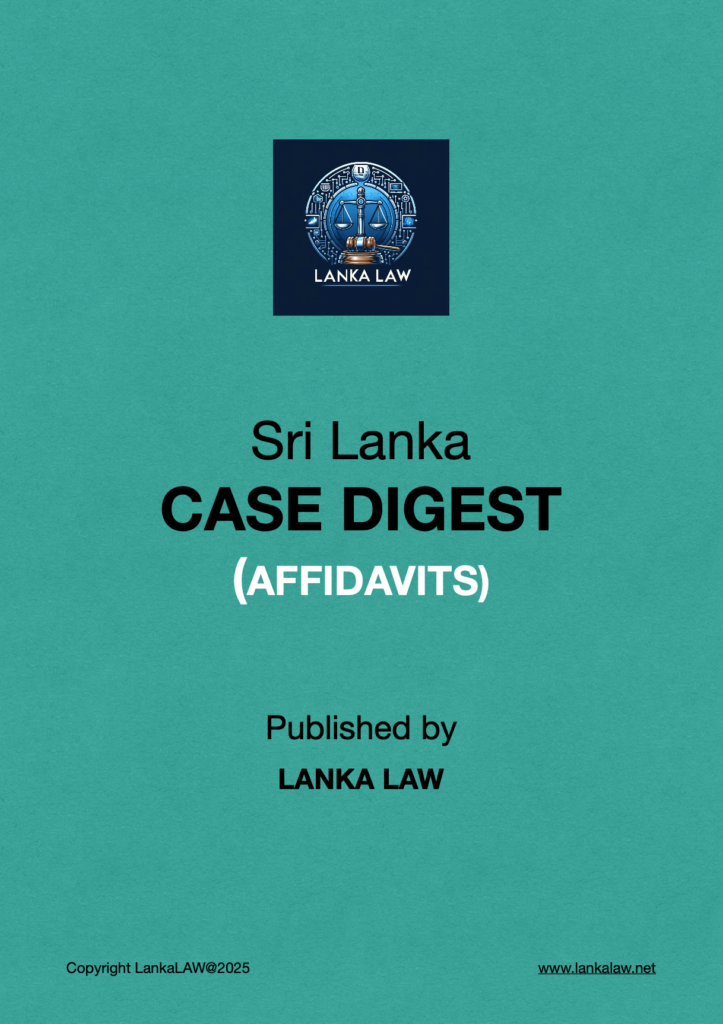Introduction
An affidavit is a written statement sworn to be true by the deponent, used as evidence in legal proceedings. Affidavits play a crucial role in both civil and criminal cases, serving as evidence in court, administrative proceedings, and business transactions. This article explores the legal principles surrounding affidavits, significant case law, and key judicial decisions that have shaped their admissibility and validity.
Legal Framework and Admissibility
Affidavits are governed by statutory provisions and procedural rules in various jurisdictions. In Sri Lanka, for instance, the Civil Procedure Code and Evidence Ordinance regulate their admissibility. Courts generally require affidavits to be properly notarized, contain truthful statements, and be free from ambiguity. Defects such as perjury, improper attestation, or lack of authority can render an affidavit invalid.
An affidavit typically consists of:
- A heading stating the court and case details
- An introductory section identifying the deponent
- A body containing statements of fact
- A jurat clause affirming the truthfulness of the content
- A signature of the deponent and attestation by an authorized official
In legal practice, affidavits are commonly used for:
- Supporting applications for court orders
- Verifying facts in civil disputes
- Swearing evidence in administrative or government procedures
- Establishing evidence in business transactions
- Confirming the execution of legal documents
Key Case Laws and Judicial Precedents
1. Senanayake v. Commissioner of National Housing and Others (SLR 2005 Vol. 1 p. 182)
This case highlighted the importance of accuracy in affidavits submitted in administrative and legal disputes. The court ruled that material misstatements could lead to the rejection of an affidavit. Additionally, it emphasized the duty of full disclosure and the necessity of clarity in legal affidavits.
2. Weeraman v. Sadacharan (SLR 2002 Vol. 3 p. 222)
The court addressed whether an affidavit can be considered valid if not properly attested. It was held that failure to adhere to procedural requirements could render an affidavit inadmissible. This case reaffirmed that an affidavit must be signed before an authorized officer and must include all formalities prescribed by law.
3. Sooriya Enterprises (International) Ltd. v. Michael White and Company Ltd. (SLR 2002 Vol. 3 p. 371)
In this commercial dispute, the Supreme Court ruled that an affidavit with misleading information could be disregarded, emphasizing the duty of full disclosure in affidavits. The ruling reinforced that parties must ensure affidavits contain only facts within their direct knowledge and avoid speculative or hearsay content.
4. Clifford Ratwatte v. Thilanga Sumathipala and Others (SLR 2001 Vol. 2 p. 55)
The case reinforced the principle that affidavits used in election petitions must be strictly compliant with statutory requirements to be admissible. The decision underscored the role of affidavits in electoral litigation, where procedural rigor is crucial to maintain fairness and credibility in disputes.
5. Gunasinghe Banda v. Navinna and Others (SLR 2000 Vol. 3 p. 207)
This judgment clarified the distinction between an affidavit as substantive evidence and as supporting evidence in interim applications. It determined that affidavits should not be treated as independent conclusive proof but must be corroborated with other supporting documentation where necessary.
6. Attorney General v. Chandrasena (SLR 1991 Vol. 1 p. 85)
The court examined whether affidavits submitted in criminal proceedings must meet stricter evidentiary standards, ultimately concluding that inconsistencies could undermine their credibility. The ruling emphasized that in criminal cases, affidavit-based evidence must be scrutinized rigorously to prevent miscarriages of justice.
7. Madan Mohan v. Carson Cumberbatch & Co Ltd. (SLR 1988 Vol. 2 p. 75)
The Supreme Court held that an affidavit must be free from contradictions and should only contain facts within the direct knowledge of the deponent. The ruling reiterated the necessity for precise and truthful statements to prevent perjury and legal repercussions.
8. King v. Wijetunga (NLR Vol. 18 p. 343)
This case set an early precedent on the necessity of verifying the identity and authority of the deponent in criminal matters. It affirmed that improperly executed affidavits could be rejected by the court.
9. Hirdaramani v. Ratnavale (NLR Vol. 75 p. 67)
The judgment reaffirmed that affidavits submitted in administrative proceedings must adhere to the prescribed format and requirements. It underscored that non-compliance with statutory rules on affidavits could lead to dismissal of claims based on defective affidavits.
Best Practices for Drafting and Using Affidavits
To ensure that affidavits hold legal weight and are accepted in judicial and administrative proceedings, individuals should follow these best practices:
- Clarity and Precision: Statements should be concise, factual, and avoid unnecessary legal jargon.
- Truthfulness: False affidavits can lead to charges of perjury.
- Proper Attestation: Ensure the affidavit is signed before a notary public or commissioner of oaths.
- Compliance with Legal Requirements: Verify that all statutory requirements, such as proper formatting and jurisdictional rules, are met.
- Use of Supporting Documents: Where necessary, affidavits should be accompanied by documentary evidence to strengthen claims.
Conclusion
Affidavits remain a fundamental aspect of legal proceedings, offering sworn testimony in various contexts. Courts continue to emphasize compliance with procedural formalities, truthfulness, and proper execution to ensure their validity. The case laws discussed provide essential insights into the judicial approach toward affidavits, reinforcing their role as critical evidence in litigation and administrative matters. Adhering to best practices in drafting affidavits helps ensure their admissibility and effectiveness in judicial processes.
Download Related Judgments















